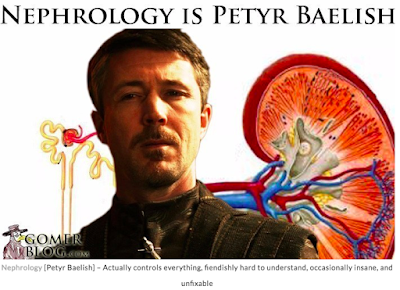 |
| From Gomerblog http://gomerblog.com/2014/05/medical-specialty |
The multiple-choice question (MCQ) is the workhorse of medical education. All of the major testing stakeholders (National Board of Medical Examiners, American Board of Medical Specialties, etc.) use MCQs to make major promotion and licensing decisions. So, it’s important to understand how to answer MCQs accurately and efficiently.
Let’s review how to approach board-style MCQs. Because they’re so heavily scrutinized, these MCQs tend to be bulletproof against the hacks that unravel poorly written questions. However, a strategic approach to MCQs can help you apply your knowledge to achieve the score you deserve.
First, some definitions are imperative. MCQs consist of a stem and options. The options consist of several distractors and one correct answer (highlighted yellow in this blog).
In normal lung physiology, which of the following gases is exchanged across the alveolar membrane? [stem]
A. Oxygen [answer]
B. Helium
C. Methane
D. Radon
E. Chloroform
First, look at the stem, and ask yourself, “is the material in the stem needed to answer the question?” Board-style MCQs infamously include an exhaustive case presentation with extraneous history, exam, and lab data. With an average time allotment of only 2 minutes per question, it may be helpful to ignore anything you don’t need.
In the following question, the options have no relationship with the stem, so looking at the options first can save a lot of time:
A 62-year-old man presents with acute, substernal chest pain. Physical exam reveals diaphoresis and bibasilar crackles. Serum troponin is 20 ng/ml and EKG reveals ST-segment elevation in leads V2–V6.
Which of the following is a risk factor for coronary artery disease?
A. Cigarette smoking
B. “Type B” personality
C. Diet rich in fruits and vegetables
D. Excess water intake
E. Regular exercise
Second, look at the options, and ask, “are the distractors plausible?” Board-style MCQs usually supply reasonable options, but the list is often easily reducible to 2-3 likely possibilities. In this question, only one of the options could reasonably be correct, at least by the standards of modern medicine:
Which of the following is the MOST EFFECTIVE treatment for an acute gout attack?
A. Purging
B. Bleeding
C. Moxibustion
D. Radioactive waters
E. Colchicine
Third, ask “are the options homogeneous?” Asymmetric options are rare in board-style MCQs, but differences in option length, verb tense, and number agreement can alert you to distractors. In this question, the longest option, which includes a singular response to match the singular question (“next test”), is correct:
A 23-year-old woman with no significant medical history presents to the emergency department with sudden-onset, severe headache. Blood pressure is 186/102, heart rate is 56, and temperature is 38.6°C. Funduscopic exam reveals mild papilledema. The most appropriate NEXT TEST would be
A. WBC count
B. Head CT, followed by lumbar puncture if no mass lesion is found
C. Frequent neurologic exams
D. Cranial decompression
E. Antibiotics
Finally, again considering the options, ask yourself, “did I avoid superlatives?” Options that contain “always,” “never,” “all,” or “none” are frequently distractors because the absolute nature of these terms doesn’t match the real-life uncertainty of clinical medicine. On the other hand, descriptors such as “usually normal” may be too vague to be listed in a correct answer:
A 19-year-old woman notes a malar, photosensitive rash and wrist arthralgias. Heart and lung exams are normal. White blood cell count is 2.6 K/mcl, hemoglobin is 9.2 g/dl, and platelets are 36 K/mcl.
A diagnosis of lupus is MOST LIKELY in this patient for which of the following reasons?
A. Malar rash is always diagnostic of lupus.
B. Pancytopenia may be associated with lupus.
C. Pulmonary exam findings are never normal in lupus.
D. Joint exam findings are usually normal in lupus.
E. All of the above.
While these strategies can’t substitute for true understanding, they may help you avoid some common pitfalls in answering MCQs.
Good luck on the boards!
“Superficially, it might be said that the function of the kidneys is to make urine; but in a more considered view one can say that the kidneys make the stuff of philosophy itself.”
— Homer Smith, Lectures on the Kidney, 1943
More Reading
How to Construct Multiple Choice Questions
NBME Constructing Board Questions
Effectively Writing Questions
Another good review on writing questions
James Novak
Nephrology Program Director
Henry Ford Hosptial
NSMC Intern Class of 2018




